Impact of climate change on production and recycling of crop biomass and soil nitrogen use: a case study with maize under extreme rainfall events in Zimbabwe.
Research questions
- Impact of extreme rainfall events on synchronization/asynchronization between the need of plants for mineral nitrogen and the availability of nitrogen (from the mineralization of soil organic matter, the recycling of crop residues, and nitrogen fertilization), and the role of mulch in water interception and retention.
- Influence of climate on plant production loop return of plant biomass to the soil (quantitative and qualitative changes), organic matter and mineralization, and plant nutrition.
General context
This PhD thesis will study the impact of rainfall (from drought to extreme rainfall) on crop production and soil functioning, in a context of sustainable intensification of the agricultural practices. The focus will be on maize (Zea mays L.), one of the most common staple crops globally, in a sub-humid region of Zimbabwe where erratic and extreme rainfall events are widespread.
Importance of the research question
The IPCC predicts (and already observes) an increase in extreme events in terms of frequency and intensity due to global warming (IPCC, 2021). Many studies have assessed the impact of climate change on agricultural production or soils, but considering average changes in temperature, atmospheric CO2 concentration or precipitation (Falconnier et al., 2020; Jägermeyr et al., 2021). On the other hand, knowledge is much more incomplete with regard to these extreme events.

Abderrahim BOUHENACHE
PhD Student
Duration
2022-2025
Location
Reims, France
Harare, Zimbabwe
Supervision
Supervisor: Sylvie RECOUS (INRAE, UMR FARE)
Co-supervisor: Gwenaëlle LASHERMES (INRAE, UMR FARE)
Co-supervisor: Rémi CARDINAEL (CIRAD, UR AIDA)
Extended supervision team: Regis CHIKOWO (University of Zimbabwe), Hugues CLIVOT (URCA, UMR FARE), Marc CORBEELS (CIRAD, UR AIDA)
Biography
Abderrahim is an Agronomist in Cropping Systems. His skills focus on sustainable plant production and agroecology. He is trained in experimentation and agricultural surveys, and he is passionate about the field and crop modeling. Abderrahim can deal with different themes at scale ranging from plant to the territory with a “cropping system” preference. He also has a keen interest in resilience and adaptation to climate change, management of resources at the farm level and to diffuse pollution problems of agricultural origin.
